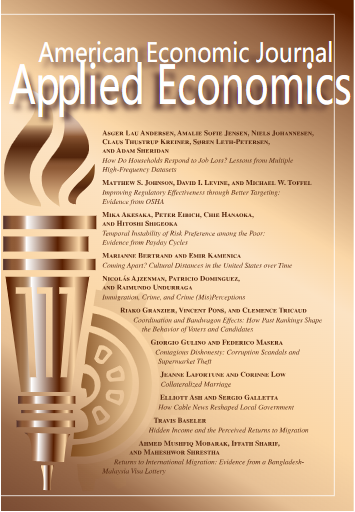健康不平等的根源和家庭内部专业知识的价值。
IF 6.2
1区 经济学
Q1 ECONOMICS
引用次数: 0
摘要
在瑞典的情况下,我们表明,家庭中有一名医生增加了整个生命周期的预防性保健投资,改善了身体健康,延长了寿命。两个准实验研究设计——医学院录取抽签和医学学位授予时间的变化——支持对这些影响的因果解释。假设一项政策能给所有瑞典人带来同样的健康行为改变和好处,那么它将缩小18%的死亡率-收入梯度。我们的研究结果表明,接触健康相关专业知识的社会经济差异可能会对健康不平等产生有意义的影响。本文章由计算机程序翻译,如有差异,请以英文原文为准。
The Roots of Health Inequality and the Value of Intrafamily Expertise.
In the context of Sweden, we show that having a doctor in the family raises preventive health investments throughout the life cycle, improves physical health, and prolongs life. Two quasi-experimental research designs-medical school admission lotteries and variation in the timing of medical degrees-support a causal interpretation of these effects. A hypothetical policy that would bring the same health behavior changes and benefits to all Swedes would close 18 percent of the mortality-income gradient. Our results suggest that socioeconomic differences in exposure to health-related expertise may meaningfully contribute to health inequality.
求助全文
通过发布文献求助,成功后即可免费获取论文全文。
去求助
来源期刊

American Economic Journal-Applied Economics
ECONOMICS-
CiteScore
9.10
自引率
1.60%
发文量
63
期刊介绍:
American Economic Journal: Applied Economics publishes papers covering a range of topics in applied economics, with a focus on empirical microeconomic issues. In particular, we welcome papers on labor economics, development microeconomics, health, education, demography, empirical corporate finance, empirical studies of trade, and empirical behavioral economics.
 求助内容:
求助内容: 应助结果提醒方式:
应助结果提醒方式:


